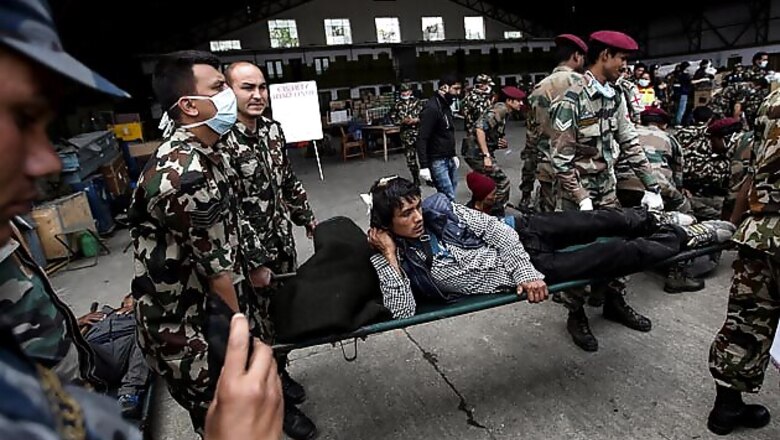
views
Kathmandu: Even as Nepal struggles to come to terms with its worst earthquake disaster in over eight decades, rescuers from around the world are scrambling to locate survivors and bring succour to the needy. Humanitarian efforts have poured in from all parts of the world, from the day the disaster struck the Himalayan nation, killing over 6,200 people. The rescue operations have also pitted two arch-rivals India and China who have sent their teams to the ravaged nation.
Although Chinese military apparatus is considered to be much more advanced, it is the Indian armed forces which are being lauded for their commendable efforts in carrying out relief and rescue work in a nation that is struggling to come to terms with the massive devastation.
India's swift action and its military's massive operation to evacuate thousands of Indians and foreign nationals from quake-hit Nepal has put China's People's Liberation Army (PLA) on the defensive with questions being raised as to why its efforts to rescue stranded Chinese nationals did not match that of India. The Chinese media has raised questioned why air force planes were not deployed to airlift over 8,000 Chinese many of who are still stranded in Nepal.
In a rare comparison of India's military with the PLA, the world's largest, Chinese defence spokesman Geng Yansheng was confronted with the question at a briefing as to why the military did not use planes to airlift stranded Chinese when India had done so to ferry its nationals.
There is considerable annoyance in China over the slow process of airlifting of Chinese tourists as well as workers employed in various Beijing-funded projects in Nepal as the task was given to a number of civilian airlines. There were also reports of some of the airline companies demanding heavy fare which was subsequently denied.
Besides airlifting thousands of its citizens, the Indian Air Force also transported about 170 foreign nationals from 15 countries to India. Several others were also transported through special buses from across the border to Bihar.
Defending the move to use civilian aircraft, Geng said "Whether to use military aircraft to transport people from a disaster area this is to be decided by various factors". He said after the earthquake, the Chinese government had organised a number of civilian commercial flights to evacuate Chinese citizens stranded in Nepal.
India's quick response to send search and rescue teams besides relief supplies has been reported by sections of the Chinese media while China too dispatched rescue teams and planes with supplies by which time the Indian presence on the ground had swelled.
Earlier, the Chinese foreign ministry played down reports of competition with India to assist quake-hit Nepal and offered to work with New Delhi "positively" in the relief efforts to help the Himalayan nation overcome the crisis. "China and India are neighbours to Nepal. We would like to work together and coordinate positively with India in our assistance efforts in Nepal to help it to overcome the difficulties and rebuild its homeland," Chinese foreign ministry spokesman Hong Lei had said on Tuesday.
A 7.9 Richter scale earthquake and succeeding aftershocks tore through Nepal on April 25, leaving a trail of deaths and unimaginable devastation.
While rescue efforts are on, Nepal's Army Chief General Gaurav Rana fears that the death toll in the quake could be as high as 15,000. "Our estimates are not looking good. We are thinking that 10,000 to 15,000 may be killed," he said.
Rana acknowledged that the massive temblor left officials struggling to cope with the aftermath - including the risk of disease and growing public anger at the pace of the rescue effort. "There is unrest, and we are watching it. Yes, there is the threat of an epidemic, and we are watching it," he said stressing that the army was working with the police to "identify local hot spots and control things politically."




















Comments
0 comment